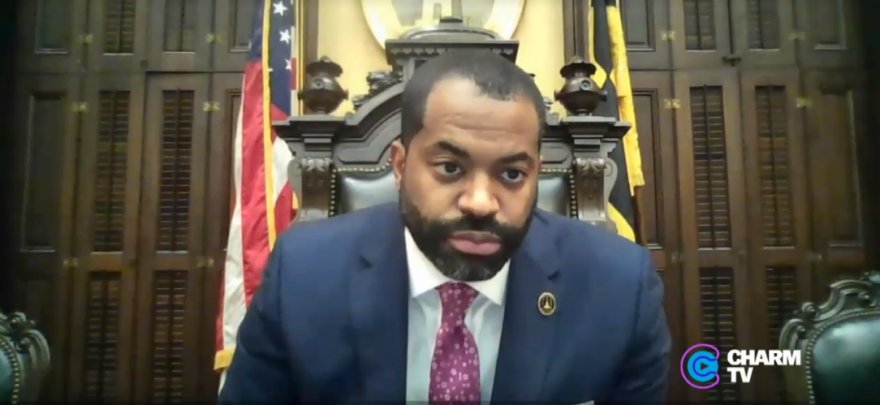Baltimore City Council members introduced a package of housing relief bills Wednesday night during a reconvened meeting that was suspended earlier this week when the city’s video conferencing system failed due to a Webex outage.
Though the coronavirus pandemic is not the genesis of the city’s longstanding housing insecurity issues, its resounding effects — shuttered businesses, job losses and long lines for unemployment benefits — have exacerbated the crisis.
One bill targets the late fees that landlords charge tenants. It would require city leases to include a 10-day grace period before a landlord may begin to charge late fees on rent payments. It would also limit how much landlords may charge for late fees: no more than 1% of monthly rent for each day the tenant is late, not to exceed a total of 5%.
The bill also would forbid landlords from charging tenants who receive public benefits from late fees before the public assistance money arrives.
“Residents who receive public assistance are especially at risk, said sponsor Robert Stokes, a Democrat representing Northeast Baltimore. “You still have to pay your rent, but it will provide relief for vulnerable residents during this crisis.”
Another bill requires landlords who own or control 10 or more rental units to offer alternatives to security deposits, should those deposits exceed 60% of the monthly rent.
Those alternatives include proof of renter’s insurance or a payment plan that allows renters to spread the deposit over no less than three equal monthly payments.
“We all know that a security deposit is the money of the renter,” Council Vice President Sharon Middleton, the bill’s sponsor, said. “This bill should definitely be encouraging to landlords to take a closer look at their planning and development strategies facing housing instability in our city.”
The bills were both assigned to the council’s new Economic and Community Development Committee, chaired by Middleton. Stokes, John Bullock, Mark Conway, Ryan Dorsey, Antonio Glover and Odette Ramos, all Democrats, are its members.
Glover plans to introduce a bill to close an “eviction loophole” later this month. The legislation would prohibit a legal process called “tenant holdover,” which allows a landlord to remove a tenant whose lease has expired without providing a reason for not renewing or extending the lease.
On Monday, Ramos introduced a bill to create a monthly payment plan for homeowners who are behind on paying their taxes and liens in order to avoid having their properties go up for tax sale.
Council President Nick Mosby called the package an attack from multiple angles on Baltimore’s housing insecurity.
“A safe, stable and secure home is the foundation families need to thrive,” the Democrat said.
Councilman Zeke Cohen, a Democrat who represents Southeast Baltimore, introduced a resolution to require council members to be trained in trauma-informed care — a framework of care grounded in an understanding of the impact of trauma on physical, emotional and mental health.
“When we come into constant contact with people who are suffering, we ourselves absorb some of their pain,” Cohen said. “This training will help to unpack the pain we’ve experienced in the city to provide the path forward.”
The resolution is a companion to Cohen’s Elijah Cummings Healing City Act, which requires city employees to receive trauma-informed care training in order to lessen the impact of trauma while performing their jobs. Former mayor Jack Young signed the bill into law last winter; it went into effect this year.
Cohen first wrote the legislation after a 2019 shooting at Frederick Douglass High School that left special education assistant Michael Marks injured. Students at the school, who worked alongside Cohen in writing the act, said the school’s handling of the shooting was insufficient and re-traumatized many.
Last week, state Del. Robbyn Lewis said she will sponsor similar legislation in Annapolis.





